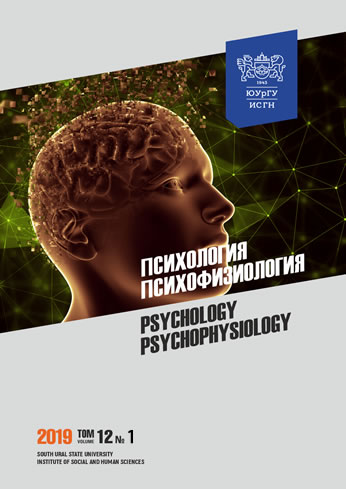FAMILY CONSCIOUSNESS OF MEN AS INDIVIDUAL PSYCHOLOGICAL REALITY
Keywords:
family, family relations, family self-consciousness of men, the structure of family self-consciousness, marriage, fatherhood
Abstract
Urgency. The modern Russian family is characterized by a change in the role structure, egalitarization of family and marital relations, and a change in men role in the family. In this regard, it is interesting to study the men’s family consciousness in terms of assessment of specifics of their awareness of himself as a family member and the subject of family relations. The aim of the study is to study the general structural and substantive characteristics of the men’s family identity and their characteristics depending on the length of marriage, paternity experience and the number of children in the family. Description of the study . The study is based on the subject-activity and personality-oriented approaches. The authors conduct phenomenological analysis of the category “family self-consciousness of men” in conjunction with its cognitive, emotional, behavioral components. The empirical study was conducted on a sample of 120 men living in the cities of Sverdlovsk region, aged 27 to 49 years (M=35 years), from 3 to 27 years of marriage (M=10 years), with minor children. Results. The definition of family self-consciousness as self-awareness of a family member and the subject of family relations is given; the three-component structure of family self-consciousness is theoretically substantiated. We described and empirically studied the most important family roles of men as a subjects of family relations. Empirically revealed features of family consciousness of men, depending on the length of marriage, paternity experience and the number of children in the family. Conclusion. The most important family roles of a man are husband and father. At the same time, the dominant role in the self-awareness of a family member belongs to the patterns of marital relations, while the attitude of a man towards himself as a family man is determined by self-realization in fatherhood. Significant differences in the family self-consciousness of men, depending on the length of marriage and paternity, the number of children in the family. With the increase of the length of marriage and paternity experience in men, there has been smoothing of conflicts between family and professional roles, the self-attitude of man to himself, as a family member, becomes more positive, self-confidence increases, positive parental patterns are formed more successfully. Matrimonial relations are closely related to the experience of fatherhood and the number of children in the family. At the same time, the highest degree of satisfaction of a man with marriage is observed during the transition of the family to the status of a large one. Recommendations. The findings can be used in psychological support of man as a subject of family relations, in the organization of psychological service of family support, as well as in the process of professional training and retraining of specialists in working with the family.Downloads
Download data is not yet available.
Published
2019-07-12
How to Cite
Barinova, E., & Vasyagina, N. (2019). FAMILY CONSCIOUSNESS OF MEN AS INDIVIDUAL PSYCHOLOGICAL REALITY. Psychology. Psychophysiology, 12(1), 5-15. https://doi.org/10.14529/psy190101
Issue
Section
Общая психология
Copyright (c) 2019 Psychology. Psychophysiology

This work is licensed under a Creative Commons Attribution-NonCommercial-NoDerivatives 4.0 International License.



